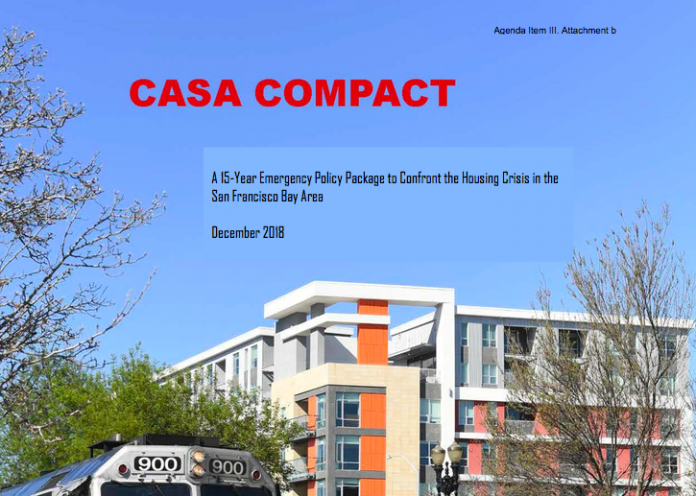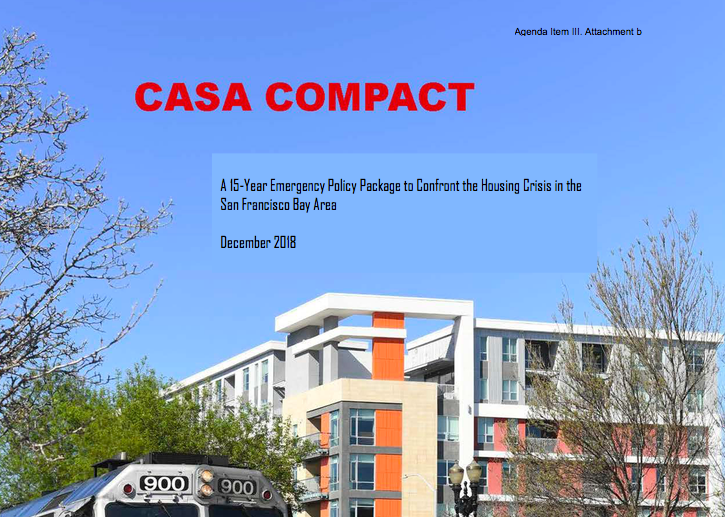
48hills filed suit in San Francisco Superior Court today asking a judge to order the Metropolitan Transportation Commission to release full reports of how much public money was spent on the Committee to House the Bay Area (CASA).
The lawsuit demands all documents that show MTC funding going to CASA from the first day the regional transit agency helped create that group, which was chartered with finding a “grand solution” to the Bay Area’s housing crisis.

In fact, as we’ve reported, CASA wound up with a set of proposals that will help developers and encourage unlimited growth with no protections for vulnerable communities.
Some of the meetings have been secret. We have had to struggle to get basic documentation. And our latest request, from reporter Zelda Bronstein, led to a lengthy delay and then only partial disclosure of information.
Bronstein asked the MTC to provide all records of any public money that went to fund CASA. Her first request was in Deember, and MTC did not provide the documents. According to the lawsuit:
On March 6, 2019, Ms. Bronstein renewed and reiterated her earlier CPRA request in another email to Mr. Goodwin. Specifically, the request sought “all documents” concerning the following: “monies [both public funds and contributions from private parties] that have to date passed through the Metropolitan Transportation Commission to fund CASA, the Commission to House the Bay Area, including but not limited to funding for MTC staff to pitch the CASA Compact to city councils, boards of supervisors, and other entities, both public and private, since January 17, 2019, when the ABAG Executive Board authorized Board President David Rabbit to sign the Compact.”
On March 18, MTC asked for a 14-day delay in responding. Then on April 1, MTC asked for another delay. The California Public Records Act requires agencies to respond to public records requests within 10 days, and allows one 14-day extension in exceptional circumstances. There is no statutory allowance for any futher delay.
On April 10, MTC produced documents with expenses from only January 2019 to March 2019 – ignoring the request for all public spending since CASA was created.
This is critical: MTC, a public agency, has clearly spent some – and possible a lot – of public money on a private operation that has a clear political goal of pushing legislation that will allow more market-rate housing in the Bay Area.
Help us save local journalism!
Every tax-deductible donation helps us grow to cover the issues that mean the most to our community. Become a 48 Hills Hero and support the only daily progressive news source in the Bay Area.
We need to know how much taxpayer money went to that operation and how it was used.
As we reported in January:
CASA has two sub-groups: a 32-member Technical Committee, which has done most of the work, and an eighteen-member Steering Committee that has itself been steered by CASA’s three co-chairs and Heminger. From June 2017 to December 2018, the Technical Committee met publicly almost every month; the Steering Committee met publicly six times on an irregular basis.
Only three of the public meetings published written minutes, and only one of those three (the summary of the Technical Committee’s first meeting on June 28, 2017) documents the names of the speakers and summarizes what they said. The other two only name CASA members in attendance and people who spoke at public comment. Two meetings lack official video or audio documentation; three have only audio. And of course the secret meetings have no public documentation at all.
If the meetings were secret, how do we know that they took place?
Simple: At the public meetings, Technical Committee members repeatedly referred to them. They professedly met at night, on weekends, and on at least one holiday: On November 14, Covarrubius boasted to the Steering Committee, “We were here six hours on Veterans Day, about 30 people”—“here” being MTC headquarters.
The most spectacular instance of this covert activity came to light at the Steering Committee’s Dec. 12 meeting, when Oakland Mayor Libby Schaaf referred in passing to a trip that she and other, unspecified CASA participants had recently taken to New York City. That trip never appeared on any CASA agenda, nor was it ever mentioned at any of CASA’s public meetings before it took place. I’ve filed a Public Records Act query with MTC asking to see documentation of the costs associated with each member’s travel, room, and board as well as itineraries and agendas.
I also asked the California First Amendment Coalition about the legality of CASA’s lack of written minutes. I was told that because CASA is not an official legislative or judicial body, it is not subject to the Brown Act and does not have to publish written minutes of its meetings.
At the CASA Technical Committee’s meeting of May 16, committee Co-chair Covarrubias approached me and said, “You’re a journalist?” I replied: “Yes. I have to come to these meetings, because there are no minutes.” Covarrubias: “We like it that way.”
…but is publicly financed
Technical Committee members—all volunteers—repeatedly congratulated each other on their diligence and dedication. And they did work very hard. But their labors were considerably eased by MTC’s largesse, which included a free, tony meeting space; free food; ample support from staff and paid consultants; grants for outreach to community-based organizations; a place on MTC’s website that featured a professionally produced video; a telephone poll “of all Bay Area residents;” and the trip to New York City.
Public agencies can’t have secret policy groups to carry out a pro-developer agenda without the rest of us knowing where the money comes from.
Thomas Burke, a partner at Davis, Wright, Tremaine who is representing 48hills, said that the MTC is a public agency, and has no right to withhold these records. “The information we asked for should have been provided right away. We have been asking for this information since January. The MTC tried to delay twice, then provided only partial information. We are asking the court to hold them accountable.”
We will keep you posted as this case goes forward.

